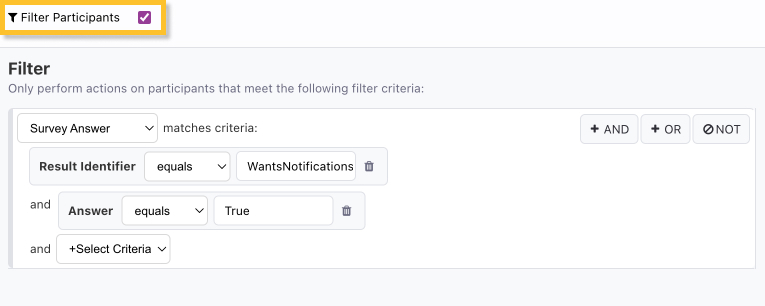Schedule Types
Overview
Once you've clicked "Add a Schedule," you will be prompted to "Choose a Schedule Type." The following schedule types each offer different configuration options and behaviors:
| Schedule Type | Description | Filter for specific participants? | Specify time of day? | Repeat? |
|---|---|---|---|---|
|
On Enrollment |
Performs action for each participant immediately upon enrollment |
Yes | No | No |
|
On Entering a Segment |
Performs action for each participant upon entering a specific segment |
Yes |
No |
No |
|
On Meeting Criteria |
Performs action for each participant upon meeting criteria specified within schedule | Yes | No | No |
|
Based on Participant Events |
Performs action for each participant relative to a participant event or survey response |
Yes | Yes | Yes |
|
|
Performs action for each participant at a specified date and time |
Yes | Yes | Yes |
Schedules only apply to participants from the time they are created onward, or within the active dates selected (under "Advanced" settings). They do not apply to participants who met the schedule criteria before the schedule was created (e.g., if you create an On Enrollment schedule after you’ve already enrolled a participant, the schedule will not perform the specified actions for the previously enrolled participant).
Additional settings for the various schedule types are described at the bottom of this article.
On Enrollment
The "On Enrollment" schedule type will perform the specified schedule action(s) immediately after a participant enrolls in your project. Use this schedule type to configure the participant’s initial experience in the study.
In the example below, the schedule is set to send the Baseline survey and WelcomeMessage notification to the participant immediately after they complete enrollment.
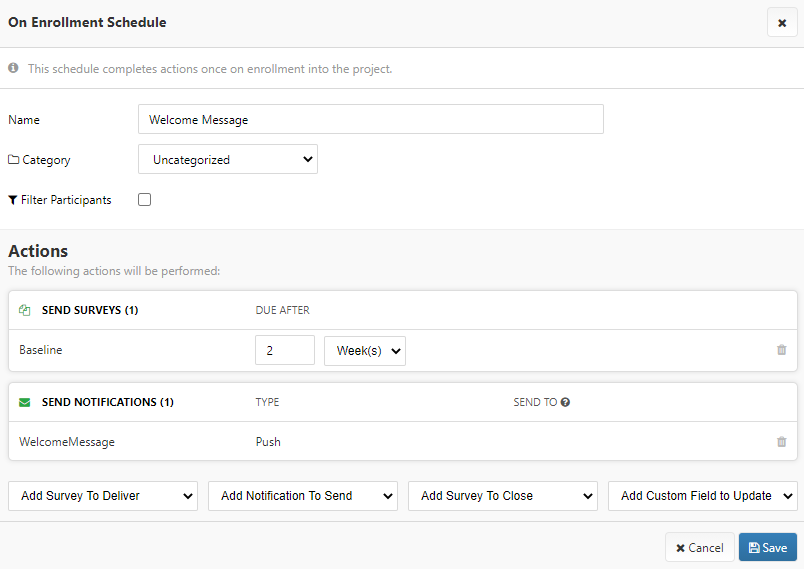
On Entering Segment
The “On Entering a Segment” schedule type will perform the specified schedule action(s) whenever a participant satisfies the logic criteria defined by a previously created segment. For example, you may wish to remind participants to submit a daily nutrition survey if they have not submitted a response in the last 24 hours.
This type of schedule can trigger multiple times for the same participant, if they enter a segment, leave the segment, and then re-enter.
In the example below, when a participant meets the “Daily Nutrition - No Response in Last 24 Hours” segment criteria, they will receive the Daily-Nutrition-Reminder push notification. If a participant receives the notification and submits the survey, they will leave the segment. If the participant goes another 24 hours without submitting the survey, they will re-enter the segment and receive this notification again. If the participant receives this notification and does not submit a survey response, they will remain in the segment, and the schedule will not re-run for them.
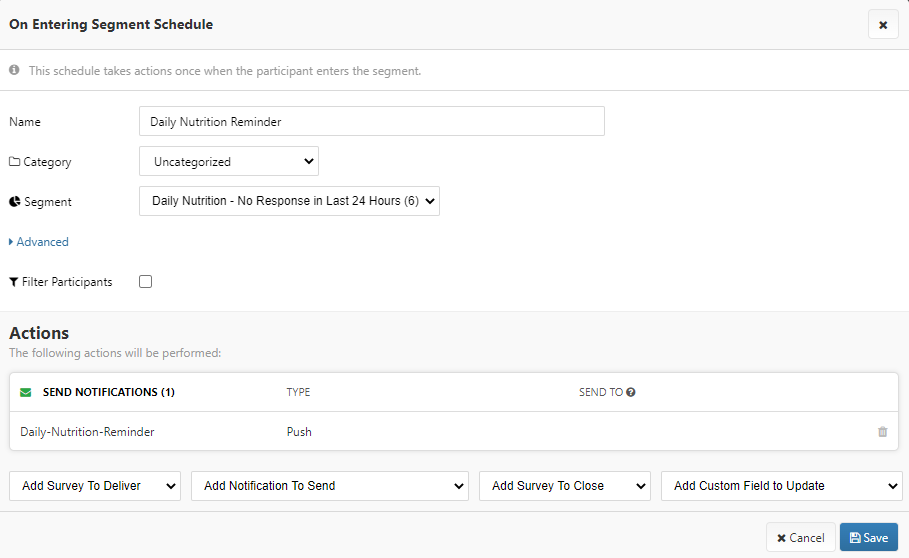
When configuring this schedule type, you must select a Segment.
On Meeting Criteria
The "On Meeting Criteria" schedule type will perform the specified schedule action(s) when a participant meets the specified criteria. This is similar to the On Entering Segment type, except you do not need to have an existing segment to configure this schedule type. For example, you may want to send materials to participants at a certain clinic, as specified by a custom field.
This schedule type does not apply retroactively.
In the example below, the schedule will send the Resources-Beyondtheall push notification to participants when their Clinic custom field is updated to "BeyondtheWall".
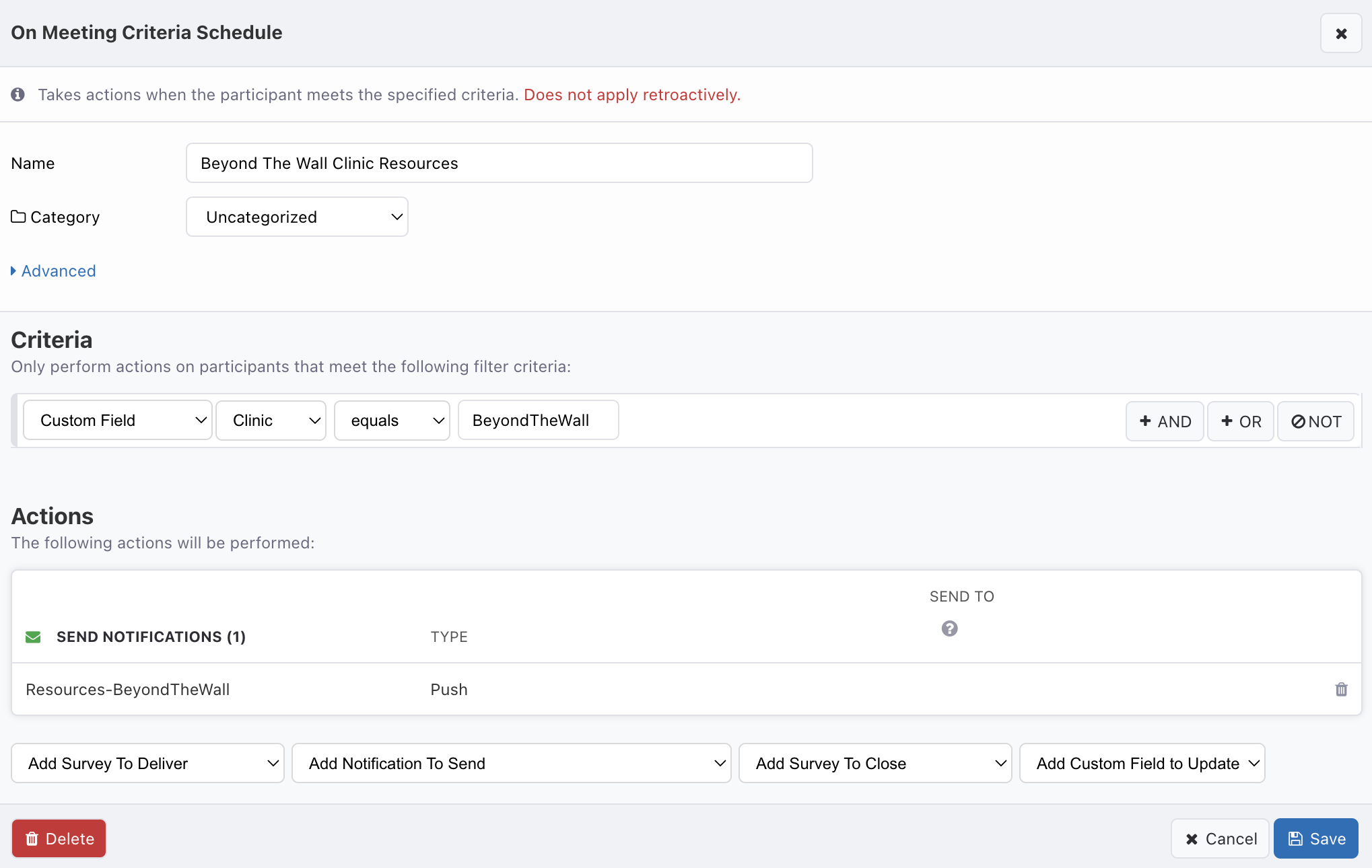
Based on Participant Events
The “Based On Participant Events” schedule type will perform the specified schedule action(s) relative to a participant event (e.g., enrollment, or a date-based custom field, such as SurgeryDate). Use this schedule type during the study participation phase, when participants may reach milestones at different times.
The scheduled action(s) will not be performed for participants who have an empty or null value for the selected Participant Event.
Start Delivery Options
If “Based on Participant Events” is selected, you must designate a participant event and relative timing for the schedule to run. This is defined in the “Start Delivery” section of the schedule.
- Enrollment: Allows for scheduling relative to participant enrollment.
- Custom Field: Allows for scheduling based on a custom date field.
- Last Survey Answer Date: This option allows scheduling based on the date of the most recent Survey Answer. This option uses the timestamp of when the Survey Question was answered, not the value of the Survey Question. If the participant submits the same survey multiple times, the answer for the most recent submission will be used for the schedule logic.
In order to use this survey delivery option, the Survey Name and Step Identifier need to be specified. - Last Survey Answer Value: This option allows for scheduling based on the participant’s most recent answer value to a Survey Question. To use this start delivery option, the Survey Question should be a Date type question. If the participant submits the same survey multiple times, the answer for the most recent submission will be used for the schedule logic.
In order to use this survey delivery option, the Survey Name and Step Identifier need to be specified. - Entering Segment: Allows for scheduling relative to when a participant enters a segment. This configuration differs from the "On Entering Segment" schedule type since the schedule doesn't automatically trigger when a participant enters the segment. Rather, the schedule will trigger a specified number of day(s)/week(s)/month(s)/year(s) after the participant enters the segment and can be set to repeat. Note: The schedule will only trigger or continue to repeat as long as the participant remains in the segment.
- Incomplete Survey Task Delivery Date: This option allows for scheduling relative to the delivery date of an incomplete survey task based on a specified number of days the task remains incomplete post-delivery. For example, “1 Day After Incomplete Task Delivery Date” can be used to trigger an event one day after survey delivery. Be sure to include the survey name that correlates to the incomplete survey task delivery date.
- Incomplete Survey Task Due Date: This option allows for scheduling relative to the due date of an incomplete survey task based on a specified number of days prior to the due date of a task that is not yet complete. For example, “7 Days Before Incomplete Task Due Date” can be used to trigger an event before a survey that is due in one week. Be sure to include the survey name that correlates to the incomplete survey task due date.
What’s the difference between Last Survey Answer Date and Last Survey Answer Value?
- The “Last Survey Answer Value” option allows for scheduling based on a participant's answer to a Survey Question, whereas the “Last Survey Answer Date” option allows for scheduling based on a date when the Survey Answer was set.
- Example: A participant is tasked with completing a survey about their most recent at-home COVID-19 test. The question asks, “What day did you test for COVID-19 this week?”. The participant answers this Survey Question on 09/15/2021. The participant’s answer value to the Survey Question is: “09/10/2021.” The start delivery options would be used in the schedule as follows:
- Last Survey Answer Date: 09/15/2021
- Last Survey Answer Value: 09/10/2021
In the example below, starting at 7:00 AM (participant's local time), 2 weeks after their DeviceSetupDate, participants who set up their devices can no longer access the DeviceTroubleshooting survey.
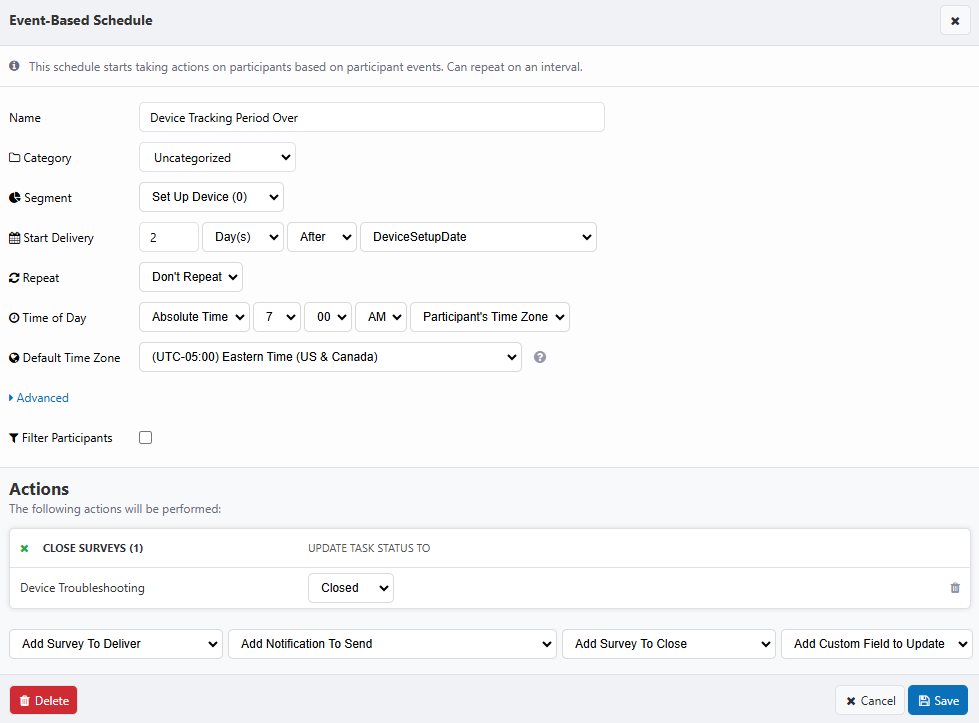
Setting a trigger to run 1 day after Enrollment and repeat every 1 day, will create a schedule that will run every day.
Based on a Specific Date
The “Based On a Specific Date” schedule type will perform the specified schedule action(s) on a specific date. Use this schedule type for study milestones based on a calendar day or to trigger repeating schedules to occur on specific days of the week.
For this schedule type, you must designate the specific date the action will occur. This schedule type supports repeated actions on a periodic basis.
In the screenshot below, enrolled participants should receive a weekly survey and notification every Monday. To accomplish this, we've set the schedule to start delivery on a Monday date, and repeat every week. Additionally, for this example, let's assume participants are able to set what time they'd like to receive the survey and notification via a survey question that is saved to the NotificationTime custom field. To trigger the schedule at this time, specify the Time of Day field to use the NotificationTime custom field in the participant's local time zone.
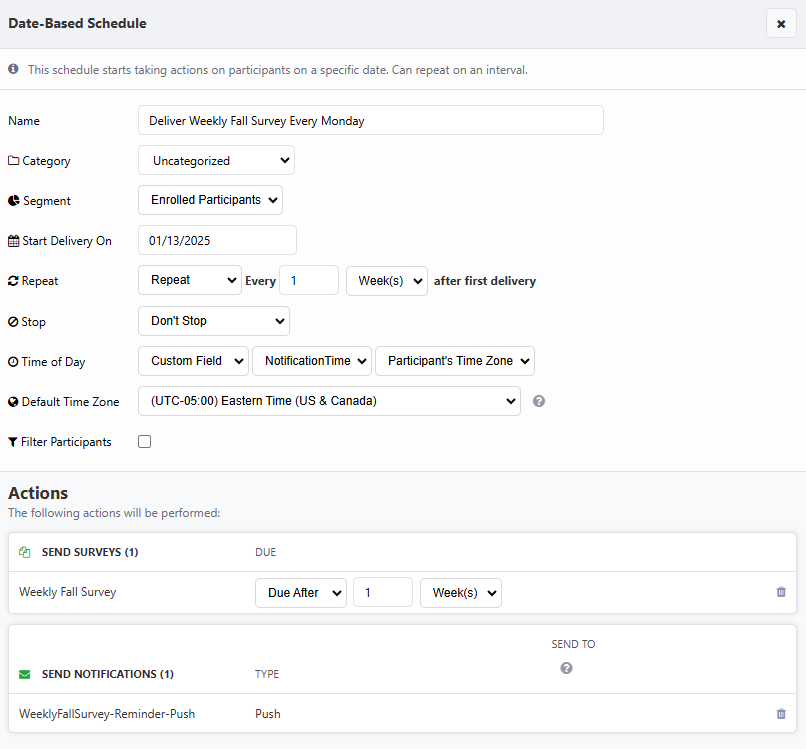
Additional Settings
Additional settings allow you to categorize schedules, further specify targeted participants, and adjust action timing.
In the “Category” section of the schedule editor, you can assign a previously specified category or create a new category. Categories allow you to organize schedules into similar groups when viewing your schedules.
Additionally, you can further specify the targeted participants and the timing of your schedule using the "Segment" section, "Advanced" section, "Time of Day" section, or "Filter Participants" section.
- Segment Selection: For the “Based on Participant Events” or “On Specific Date” schedule types, you can limit the scope of the trigger to a previously defined segment.

- Repeat: For applicable schedule types, you can enable a schedule to repeat for a certain duration or indefinitely. It is important to note that the Repeat value is relative to the first delivery, while the Stop value is relative to the event date. In the below example, the schedule will run one day after enrollment, and repeat every day until 4 days after the enrollment date, for a total of 4 triggered timepoints.

- Advanced (Active Dates): The Advanced section allows you to choose active dates for your schedule (applicable for all schedules except "Based on a Specific Date" schedules). You can choose a date and time to either enable or disable the schedule.

- Time of Day: For event-based and date-based schedules, select the time of day to trigger the action. You can either choose to trigger the schedule at an Absolute Time (i.e., the same time for everyone - in either a fixed time zone or respecting the participant's time zone) or a Time of Day custom field (i.e., the time of day the schedule triggers is specific to the value of the specified custom field for each participant).

[note]When "Participant's Time Zone" is selected, the time zone is continually updated as participants access MyDataHelps on mobile or web. If a participant is traveling to a different time zone, they must open MyDataHelps in order for the schedule to update based on their new time zone. Keep this in mind for notification schedules in particular. For example, if a participant from EST travels to MST for a week and they do not open MyDataHelps during that time they will receive notifications in EST. However, if they do open the app while traveling they will receive notifications in MST. [/note] - Filter Participants: For all schedule types (except “On Meeting Criteria”), you can define filter criteria that participants must meet in order for the schedule to trigger. For example, you may only want to send a notification to participants who answered that they want to receive notifications. To accomplish this, you can filter your schedule for participants with a survey answer indicating they want notifications.
